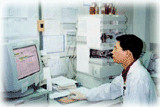RESEARCH:
Research
is considered an integral part of ICEIT and CRI
as a whole to support the country's sustainable
development, the postgraduate and training program,
as well as to solve or prevent problems in environmental
toxicology.
ICEIT
acts as a catalyst to foster research cooperation
both nationally and internationally. The center
also has ties with other scientific institutions
in developed countries, e.g. the University of
Aarhuus (Denmark), the M.D. Anderson Cancer Center
(U.S.A.), Lincoln University (New Zealand), the
International Agency for Research on Cancer (IARC-WHO),
and the Deutsches Krebsforschungszentrum (Germany),
to promote exchange of knowledge and information,
technology transfer and research collaboration.
Research
activities include a number of projects conducted
in the laboratories of CRI, with some being undertaken
in collaboration with other leading universities
or research institutes around the world to promote
technology transfer.
Seven
main lines of research are being pursued:
-
Development of techniques for detection of environmental
pollutants and their toxicities (e.g. PAHs and
benzene from traffic and cooking/grilling practices);
- Effects
of chemicals and environmental pollutants on
the environment and human health (e.g. effect
on certain risk groups, i.e. traffic police,
petrol station service attendants, etc.);
- Modulators
of the toxicity of chemicals;
- Molecular
mechanisms of toxicity;
- Molecular
epidemiology and biomarkers of environmentally
associated diseases;
- Chemical
carcinogenesis;
- Development
of biotechnology for bioremediation and detoxification
of toxic/hazardous wastes.
The research work carried out by the Center reflects
the philosophy of CRI that scientific research
should form the basis for education and training.
Moreover, the Institute organizes much of its
research as comprehensive collaborative programs
that draw on and promote the pooling of resource
persons, facilities and funding among both national
and international institutes in order to assist
in solving problems of mutual interest and concern.
Research
Facilities: |
The Chulabhorn Research Institute has
fully-equipped laboratories for cutting
edge research in 9 different areas: Biochemistry,
Biotechnology, Chemistry, Chemical Carcinogenesis,
Environmental Toxicology, Immunology,
Natural Products, Organic Synthesis and
Pharmacology. |
 |
It also has a state-of-the-art animal facility
operated in accordance with Good Laboratory
Practices (GLP), an Aquatic Toxicology Laboratory
equipped for Whole Effluent Toxicity Testing
(WET), and an Inhalation Toxicology Laboratory
for rodents, equipped for both whole-body
and nose-only exposures. |
|